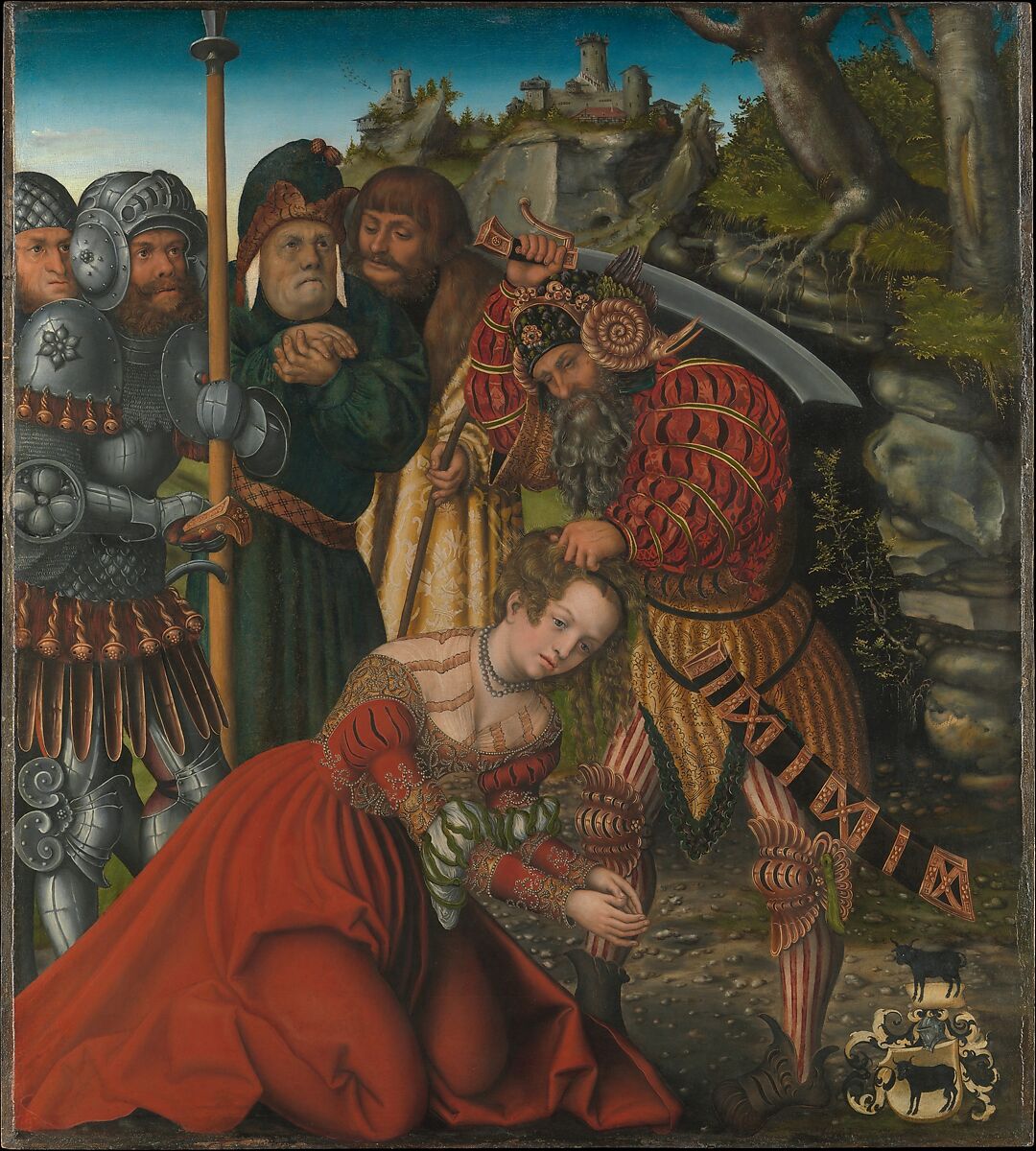
-“The Martyrdom of Saint Barbara”, Lucas Cranach the Elder, German, ca. 1510, according to legend, Saint Barbara was executed by her pagan father, Dioscorus, when she refused to recant her Christian faith. Luxuriously dressed, she seems here to calmly accept her fate as she kneels before Dioscorus, who raises his sword to behead her. The four sinister-looking witnesses may be the Roman authorities who had tortured her in an attempt to persuade her to sacrifice to pagan gods, and who later sentenced her to death. The coat of arms indicates that Cranach painted this panel for a member of the Rem family, who were wealthy merchants in Augsburg. Oil on linden. Dimensions: Overall 60 3/8 x 54 1/4 in. (153.4 x 137.8 cm); painted surface 59 3/8 x 53 1/8 in. (150.8 x 134.9 cm), please click on the image for further detail.
-by Fr. Ceslaus Kowalkowski, OP
“We have almost made it halfway through the month of November, yet the odor of sanctity from All Saints Day remains potent. It was only a couple of weeks ago that we celebrated that cloud of witnesses and intercessors who continually cheer us on, ourselves the runners moving toward the heavenly city. While the cloud is thick with people from all states of life and backgrounds, one particular bunch stands out. It is those who wear the color red, a color that speaks eloquently like the blood of Christ. This holy bunch are the martyrs. It was their blood which, poured out like the blood of Christ, became the seed for a hearty harvest. What seeds do they seek to plant in our own hearts while we still live under that cloud? They hope for us to become rhetoricians and statesmen for the city of God, the city they now dwell in and the one we run towards. What is a rhetorician? What does a statesman do? Saint Augustine provides us with some understanding and inspiration.
From the writings of St. Augustine, a “theology of martyrdom” is clear. Specifically, a theology of the martyr as a rhetorician and statesman. Doctor Adam Ployd of Yale University argues, “Christ uses the martyrs as ideal rhetors and statesman of the city of God” (Augustine, Martyrdom, and Classical Rhetoric, p. 6).
In the days of the Roman Empire, a rhetorician was someone who had been trained to speak persuasively for the purpose of causing others to take action. It was typical for the emperor to use rhetoricians to speak on his behalf to motivate or sway citizens. For St. Augustine, the ideal Christian rhetorician was able to carry out a similar essential task. He wrote, “[They] are able to live in such a way that they not only gain a reward for themselves but also provide an example to others, and their form of life becomes like an abundance of eloquence” (On Christian Teaching, 4.29.61). Before the rhetorician even opens his mouth to speak, he should live according to the wisdom he proclaims. In this exact way, the martyrs declaim the most effective and persuasive speech. What could be more eloquent than their very blood poured out for the sake of the city of God? Each of us, too, lives as a rhetorician for the heavenly city, even if our blood is never poured out. There are countless ways each day we can give witness to the heavenly city, by boldly proclaiming our love for the truth found in Jesus Christ.
In addition to the rhetorician, the statesman was traditionally responsible for establishing right order in society. For the Christian statesman, his goal is “to rule in this world in a way that conforms as closely as possible to the virtues that govern the heavenly city,” most especially through love of God and neighbor (Ployd, p. 124). How, then, does the martyr act as a statesman? Essentially, he serves as an instrument of Christ by helping to establish the right order which comes from loving God and neighbor. When the martyr sheds his blood for the heavenly king, the minds and hearts of onlookers turn toward the heavenly city where God is loved first and foremost. In our own lives, in our own day, we bring about this right order by placing God first and encouraging others to do likewise. Like the traditional statesman, this right ordering both in our own hearts and in those around us establishes authentic peace.”
St. Barbara (3rd c.) was born in Nicomedia in modern day Turkey. According to tradition, after the death of her mother she was raised by her rich and tyrannical pagan father who, because of her beauty and intelligence, guarded her closely, keeping her locked away in a tower to protect her from the outside world. She was educated by tutors and came to reject the false gods she was taught to worship in favor of the true God for whom she yearned and wished to discover, dedicating her life and virginity to this purpose. She developed a prayer life and resisted her father’s attempts to have her marry. Believing Barbara to be negatively affected by the seclusion, her father allowed her more freedom to associate with the world. She soon discovered Christians, and, recognizing the Creator she sought, and was baptized in secret. After informing her father that she was a Christian, he denounced her to the authorities under the persecution of Roman Emperor Maximian. She was imprisoned and cruelly tortured, but remained steadfast in her faith. During the night she would pray fervently, and her wounds would miraculously heal. This only subjected her to greater torments, followed by more miraculous interventions. She was finally beheaded by her own father, and afterward he was struck and killed by lightening as punishment. St. Barbara is the patron saint of firemen, armorers, artillerymen, military engineers, miners, and others who work with explosives. She is also the patron against storms, lightning, and fire, to name a few. St. Barbara’s feast day is December 4th.
Love, and His will be done,
Matthew

